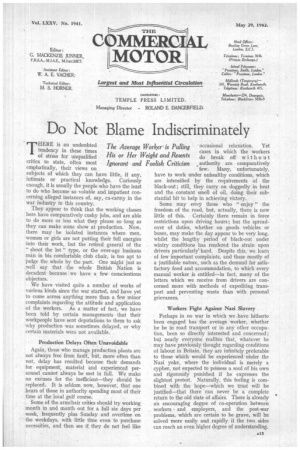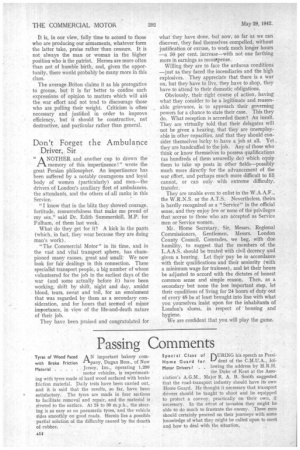Do Not Blame Indiscriminately
Page 15

Page 16

If you've noticed an error in this article please click here to report it so we can fix it.
THERE is an undoubted tendency in these times The Average Worker is Pulling of stress for unqualified His or Her Weight and Resents critics to state, often most Ignorant and Foolish Criticism emphatically, their views on subjects of which they can have little, if any, intimate or practical knowledge. Curiously enough, it is usually the people who have the least to do who become so voluble and impatient concerning alleged instances of, say, ca-canny in the war industry in this country.
They appear to think that the working classes here have comparatively cushy jobs, and are able to do more or less what they please so long as they can make some show at production. Now, there may be isolated instances where men, women or girls are not putting their full energies into their work, but the retired general of the "shoot the lot" type, or the over-age business man in his comfortable club chair, is too apt to judge the whole by the part. One might just as well say that the whole British Nation is decadent because we have a few conscientious objectors.
We have visited quite a number of works of various kinds since the war started, and have yet to come across anything more than a few minor complaints regarding the attitude and application of the workers. As a matter of fact, we have been told by certain managements that their workpeople have sent deputations to them to ask why production was sometimes delayed, or why certain materials were not available.
Production Delays Often Unavoidable Again, those who manage production plants are not always free from fault, but, more often than not, delay has resulted because their demands for equipment, material and experienced personnel cannot always be met in full. We make no excuses for the inefficient—they should be replaced. It is seldom now, however, that one hears of those in authority spending most of their time at the local golf course.
Some of the armchair critics should try working month in and month out for a full six days per week, frequently plus Sunday and overtime on the weekdays, with little time even to purchase necessities, and then see if they do not feel like • occasional relaxation. Yet cases in which the workers do break off without • authority are comparatively few. Many, unfortunately, have to work under unhealthy conditions, which are intensified by the requirements of the black-out ; still, they carry on doggedly in heat and the constant smell of oil, doing their substantial bit to help in achieving victory.
Some may envy those who " enjoy " the freedom of the road, but, actually, there is now little of this. Certainly there remain in force restrictions upon driving hours; but the spreadover of duties, whether on goods vehicles or buses, may make the day appear to be very long, whilst the lengthy period of black-out under wintry conditions has rendered the strain upon drivers particularly' hard. Despite this, we learn of few important complaints, and these mostly of a justifiable nature, such as the demand for satisfactory food and accommodation, to which every manual worker is entitled—in fact, many of the letters which we receive from drivers are concerned more with methods of expediting transport and preventing waste than with personal grievances.
Workers Fight Against Nazi Slavery Perhaps in no war in which we have hitherto been engaged has the average worker, whether he be in road transport or in any other occupation, been so directly interested and concerned ; but nearly everyone realites that, whatever he may have previously thought regarding conditions of labour in Britain, they are infinitely preferable to those which would be experienced• under the Nazi yoke, where the individual is merely a cypher, not expected to possess a soul of his own and rigorously punished if he expresses the slightest protest. Naturally, this feeling is combined with the hope—which we trust will be justified—that there can never be a complete return to the old state of affairs. There is already an encouraging degree of co-operation between workers and employers, and the post-war problems, which are certain to be grave, will be solved more easily, and rapidly if the two sides can reach an even higher degree of understanding. It is, in our view, fully time to accord to those who are producing our armaments, whatever form the latter take, praise rather than censure. It is not always the man or woman in the higher position who is the patriot. Heroes are more often than not of humble birth, and, given the opportunity, there would probably be many more in this class.
The average Briton claims it as his prerogative to grouse, but it is far better to confine such expressions of opinion to matters which will aid, the war effort and not tend to discourage those who are pulling their weight. Criticism is often necessary and justified in order to improve efficiency, but it should be constructive, not destructive, and particular rather than general.
Don't Forget the Ambulance Driver, Sir "ANOTHER and another cup to drown the memory of this impertinence!" wrote the great Persian philosopher. An impertinence has been suffered by a notably courageous and loyal body of women (particularly) and men—the drivers of London's auxiliary fleet of ambulances. the attendants, and the others of all ranks in this Service.
"I know that in the blitz they showed courage, fortitude, resourcefulness that make me proud of my sex," said Dr. Edith Summerskill, M.P. for Fulham, of them last week.
What do they get for it? A kick in the pants (which, in fact, they wear because they are doing man's work).
"The Commercial Motor" in its time, and in the vast and vital transport sphere, has championed many causes, great and small: We now look for fair dealings in this connection. These specialist transport people, a big number of whom volunteered for the job in the earliest days of the war (and some actually before it) have been working, shift by shift, night and day, amidst blood, tears, sweat and toil, for an emolument that was regarded by them as a secondary consideration, and for hours that seemed of minor importance, in view of the life-and-death nature of their job.
They have been praised and congratulated for what they have done, but now, so far as we can• discover, they find themselves compelled, without justification or excuse, to work much longer hours —a 50 per cent. increase—with not one farthing more in earnings as recompense.
Willing they are to face the arduous conditions —just as they faced the incendiaries and the high explosives. They appreciate that there is a war on, but they have to live, they have to shop, they have to attend to their domestic obligations.
Obviously, their right course of action, having what they consider to be a legitimate and reasonable grievance, is to approach their governing powers for a chance to state their case. This they do. What reception is accorded them? An insult. They are virtually told that their delegates will not be given a bearing, that they are unemployable in other capacities, and that they should consider themselves lucky to have a job at all. Yet they are handcuffed to the job. Any of those who think or know themselves to possess qualifications (as hundreds of them assuredly do) which equip them to take up posts in other fields—possibly much more directly for the advancement of the war effort, and perhaps much more difficult to fill cannot, or can only with extreme difficulty, transfer.
They are unable even to enlist in the W.A.A.F., the W.R.N.S. or the A.T.S. Nevertheless, theirs is hardly recognized as a "Service" in the official sense, and they enjoy few or none of the privileges that accrue to those who are accepted as Service men or Service women.
Mr. Home Secretary, Sir, Messrs. Regional Commissioners, Gentlemen, Messrs. London County Council, Comrades, we beg, with due humility, to suggest that the members of the L.A.A.S. should be treated with civil decency and given a hearing. Let their pay be in accordance with their qualifications and their seniority (with a minimum wage for trainees), and let their hours be adjusted to accord with the dictates of honest common sense and simple reason. Then, as a secondary but none the less important step, let their conditions of living for 24 hours of duty out of every 48 be at least brought into line with what you yourselves insist upon for the inhabitants of London's slums, in respect of housing and hygiene.
We are confident that you will play the game.




















































